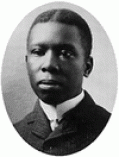Meter
the repetition of a regular rhythmic unit in a line of poetry. The meter of a poem emphasizes the musical quality of the language and often relates directly to the subject matter of the poem. Each unit of meter is known as a foot.
At Sunset Time
Paul Laurence Dunbar
Adown the west a golden glow
Sinks burning in the sea,
And all the dreams of long ago
Come flooding back to me.
The past has writ a story strange
Upon my aching heart,
But time has wrought a subtle change,
My wounds have ceased to smart.
No more the quick delight of youth,
No more the sudden pain,
I look no more for trust or truth
Where greed may compass gain.
What, was it I who bared my heart
Through unrelenting years,
And knew the sting of misery’s dart,
The tang of sorrow’s tears?
’Tis better now, I do not weep,
I do not laugh nor care;
My soul and spirit half asleep
Drift aimless everywhere.
We float upon a sluggish stream,
We ride no rapids mad,
While life is all a tempered dream
And every joy half sad
The meter in Paul Laurence Dunbar’s poem “At Sunset Time” emphasizes the musical quality of the language that Dunbar wrote the poem in. Dunbar wrote this poem in an ababcdcd meter, with three stanzas. The rhyme scheme contributes to the musical effect that Dunbar created throughout the poem, and adds to the effect Dunbar creates by using this certain meter.

"But a prayer that he sends from his heart's deep core." ~Paul Laurence Dunbar
Paul Laurence Dunbar

Paul Laurence Dunbar was born in Dayton Ohio on June 27, 1872. His father, Joseph and Mother Mitilda Murphy Dunbar were emancipated slaves. He graduated from Central High school with honors. He also served as editor of the school newspaper and was the class poet. Unable to attend college, he obtained a job as an elevator operator and wrote poetry in his free time.
He published his first book of poetry, Oak and Ivy, at his own expense in 1893. His second book, Majors and Minors, was published two years later. Due to the success of Majors and Minors he was able to publish a third volume of Poetry in 1896, Lyrics of Lowly Life, which was printed by a major publishing company. This was his most popular volume. This book contained poems written in the dialect of Southern Blacks.
The success of this volume enabled Mr. Dunbar the opportunity to travel to England. Upon his return to the United States he was hired as an assistant in the Library of Congress. In 1898, he married Alice Moore, but they separated in 1901.
Dunbar contracted tuberculosis when he was almost thirty. He tried various cures, alcohol being one of them, and he became addicted. Sick and discouraged over the lack of success of Heart of Happy Hollow (1904), he returned to Dayton where he died on February 9, 1906
(http://www.castproductions.com/dunbarbio.html)
